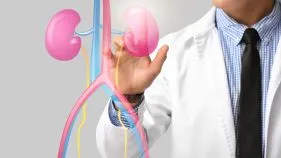Chronic Kidney Disease (CKD) is a progressive condition that affects the kidneys’ ability to filter waste and excess fluids from the blood. It’s a silent threat—many people don’t realize they have it until significant kidney damage has occurred. CKD affects millions worldwide and, if left untreated, can lead to kidney failure or the need for dialysis or transplant.
This blog post will help you understand the key symptoms, causes, stages, and treatments of chronic kidney disease so you can take proactive steps toward better kidney health.
What is Chronic Kidney Disease (CKD)?
CKD is a long-term condition where the kidneys gradually lose their function over time. Healthy kidneys filter waste, balance electrolytes, regulate blood pressure, and produce hormones. In CKD, this ability declines, causing a buildup of waste and fluid in the body.
CKD typically develops slowly over months or years and is measured in five stages, from mild (Stage 1) to complete kidney failure (Stage 5).
Symptoms of Chronic Kidney Disease
In early stages, CKD often presents no noticeable symptoms. As the disease progresses, the following signs may appear:
Fatigue and weakness
Swelling in ankles, feet, or hands (edema)
Changes in urination (foamy, dark, frequent, or reduced)
High blood pressure
Shortness of breath
Nausea, vomiting, or loss of appetite
Itchy or dry skin
Muscle cramps
Trouble concentrating
Metallic taste in mouth or bad breath
If you experience these symptoms regularly, consult a nephrologist immediately.
Causes and Risk Factors of CKD
Several conditions can cause or increase the risk of chronic kidney disease:
Diabetes (Type 1 & 2) – Leading cause of CKD
High Blood Pressure (Hypertension) – Second most common cause
Glomerulonephritis – Inflammation of kidney filtering units
Polycystic Kidney Disease – Inherited condition with cysts in kidneys
Recurring urinary tract infections or obstructions
Autoimmune diseases like lupus
Long-term use of painkillers (NSAIDs) or certain antibiotics
Other risk factors include age over 60, smoking, obesity, and a family history of kidney disease.
Stages of Chronic Kidney Disease
CKD is divided into five stages based on the Glomerular Filtration Rate (GFR), a measure of kidney function:
Stage GFR (ml/min) Description
Stage 1 90+ Normal kidney function, with damage
Stage 2 60–89 Mild decline in function
Stage 3 30–59 Moderate loss of function
Stage 4 15–29 Severe decline in kidney function
Stage 5 <15 Kidney failure (end-stage disease)
How is CKD Diagnosed?
Early diagnosis is crucial. Common diagnostic tools include:
Blood tests (Creatinine, GFR)
Urine tests (Protein, blood presence)
Imaging (Ultrasound, CT scan)
Kidney biopsy (in select cases)
Treatment Options for Chronic Kidney Disease
While CKD is not always curable, its progression can often be slowed with proper treatment:
1. Lifestyle Changes
Low-sodium, kidney-friendly diet
Blood sugar and pressure control
Regular physical activity
Quit smoking and alcohol
Weight management
2. Medications
ACE inhibitors or ARBs for blood pressure
Medications to manage diabetes
Phosphate binders and supplements
3. Dialysis or Kidney Transplant
In Stage 5 CKD, when kidney function falls below 15%, patients may require:
Hemodialysis or Peritoneal Dialysis
Kidney transplant, if eligible
Expert CKD Care at Prabhakar Bhurke Clinic
At Prabhakar Bhurke Nephrology, Urology, and Gynaecology Fertility Clinic, we specialize in early detection, personalized treatment, and ongoing care for chronic kidney disease.
Led by Dr. Sandip Prabhakar Bhurke, a senior Kidney (Renal) Nephrologist, our clinic offers:
Complete kidney function evaluations
Stage-based treatment planning
Dialysis and transplant consultation
Home visits and 24/7 video consultations
Locations in Andheri West (Lokhandwala) and Borivali West, Mumbai
Take Control of Your Kidney Health Today
Chronic kidney disease doesn’t have to be a life sentence. With early diagnosis and the right care, you can manage CKD and live a healthy, fulfilling life.
📞 Book your consultation with our expert nephrology team today and take the first step toward better kidney health.[/et_pb_text][/et_pb_column][/et_pb_row][/et_pb_section]




